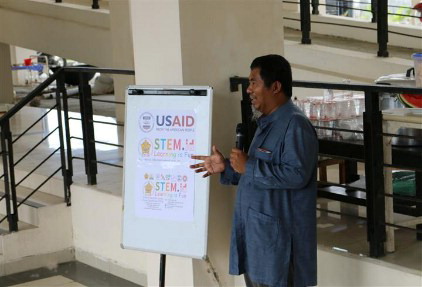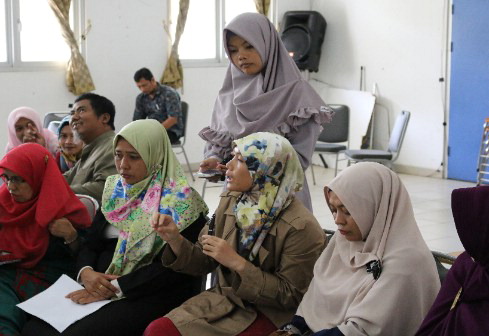|
Cycle 6 (2017 Deadline)
Integrating ISLE in integrated science instruction to improve science teachers’ abilities on STEM education
PI: Irwandi Irwandi, irwandi@unsyiah.ac.id, Syiah Kuala University
U.S. Partner: Eugenia Etkina, Rutgers, The State University of New Jersey
Project Dates: December 2017 - August 2022
Project Website: stem.id
Project Overview
Since the Program for International Student Assessment (PISA) was firstly administered, Indonesia has consistently performed poorly in science, technology, engineering, and mathematics (STEM). In 2015, Indonesia was ranked 63rd for mathematics and 62nd for science out of 70 countries. Current results of the Trends in International Mathematics and Science Study (TIMSS) also show that the abilities of Indonesian students to apply and reason in science and math are below average. One reason could be that common teaching practices in Indonesia rarely promote critical thinking skills. Therefore, improvement is needed in teacher content knowledge and skills in STEM education. Responding to this challenge, in late 2013 Indonesia launched a new curriculum promoting critical thinking, called “Curriculum 2013” or K-13. K-13 introduces the scientific approach as a teaching methodology following five stages: observing, questioning, experimenting, rationalizing, and communicating. The Indonesian government has invested a great deal in training teachers in K-13, but many problems have been encountered in implementation, as the teachers were not ready and lacked sufficient pedagogical content knowledge to integrate the scientific approach into their instruction.
Investigative Science Learning Environment (ISLE), an approach developed by U.S. partner Dr. Eugenia Etkina of Rutgers University, improves students’ scientific abilities by bringing actual science practice into the classroom. In ISLE students learn by observing real phenomena, analyzing patterns, devising explanations, and testing them experimentally (Etkina, 2015). Inspired by taking an ISLE training workshop from Dr. Etkina in 2015, the PI Dr. Irwandi and his team will use their PEER support to develop ISLE-based integrated science instruction to improve teachers’ abilities in STEM education. In the initial phase, they will apply ISLE instruction in integrated science courses at the secondary school level in Indonesia, and later they will apply it in the lab instruction component of a university-level basic physics course.
 |  | | Dr. Irwandi speaks at an event to launch the STEM Center at Syiah Kuala University (photos courtesy of Dr. Irwandi). | Participants in a focus group discussion organized as part of the project. |
Final Summary of Project Activities
The most significant achievement of this project was the creation of the Science, Technology, Engineering, and Mathematics (STEM) Research Center at Syiah Kuala University, and the activities of the PI and his team at the Center produced several key results and impacts over the course of the five years the PEER project was in operation. Over the course of the project, the PI and his team held dozens of STEM training activities for students and teachers at the kindergarten, elementary, junior high, high school, and vocational school levels. To give some idea of the scope of the training offered, following are some figures from the PI’s final report highlighting activities only in the last year of the project (2022):
- 60 high school science teachers from Aceh Province trained on the STEM Character (STEMC) modules developed by the PEER team so they can establish a local-content curriculum for secondary education in collaboration with the Aceh Provincial Education Office
- 20 elementary school teachers and principals trained on improving 21st-century skills through STEMC learning
- 50 students from Syiah Kuala University trained on they use of drones and robots
- 60 teachers and students in Aceh Besar trained on electrical, magnetic, and robotic STEMC modules
- 117 teachers, researchers, and students provided with materials for the International STEM Learning Webinar for Distance Education
The Center and its staff also contributed to the modification of the curriculum for the Master of Science in Physics program at Syiah Kuala University, with the Center designing and offering several of the courses in the new curriculum, including STEM Learning, Multimedia Physics Learning, Misconceptions in Physics Learning, and Physics Teaching Aids.
As mentioned above, the PI and his team developed several ISLE-based STEM, Remote STEM (RSTEM), and mobile/smartphone STEM (mSTEM) modules during the course of their project. They have presented their results in several peer-reviewed papers and conference presentations (see citations below) and plan to continue developing the modules and publishing additional papers even now that the PEER project has ended.
The PI Dr. Irwandi reports that local education officials and teachers are increasingly interested in STEM Education at the primary and secondary education levels, especially in Aceh. STEM-Based Character (STEMC) is one element the project team has recommended for school implementation. They have conducted STEMC module training for high school teachers throughout Aceh Province, and they also conduct roadshows to schools to implement STEMC-based learning for elementary school students. The response of teachers and students to STEMC is reportedly very positive. Several schools have contacted the STEM Research Center asking the researchers to provide special training related to STEMC to their teachers and students. The PEER team has worked closely with the Aceh Province Education Office over the course of the project to ensure that his team’s findings and recommendations can be scaled up. They have also signed cooperation agreements with several universities and secondary schools interested in implementing their instructional modules.
Now the project has ended, Dr. Irwandi indicates that he and his colleagues will continue building their network of educational research counterparts initiated under the PEER project. In 2020, they launched the first South East Asia International Science-Technology, Engineering, and Mathematics (SEA-STEM) Conference, held virtually due to the COVID pandemic. This conference has become an annual event, with the second annual conference being held in Thailand in 2021 and the third annual conference in Malaysia in 2022. The PEER team has also discussed cooperation with the private sector on developing their instructional technology. In 2023, the STEM Research Center is also expected to be proposed to the Indonesian Ministry of Education as the national Center of Excellence in Higher Education Science and Technology STEMC-Integrated Learning Systems.
Publications
F. Nufus, I. Irwandi, S. Nur, and E. Evendi. 2022. Study of ISLE-based STEM approaches and models in its use for teacher professionalism development in geometric optical case studies. Jurnal Penelitian Pendidikan IPA, 8(2), 681–686. https://doi.org/10.29303/jppipa.v8i2.1352
I.Z. Iskandar, S. Sulastri, S. Saminan, E. Elisa, Y. Yusrizal, I. Khaldun, I, and L. Hanum. 2022. Implementation of project based learning through the STEMC approach to improve students’ creative thinking skills. Jurnal Penelitian Pendidikan IPA, 8(3), 1389–1392. https://doi.org/10.29303/jppipa.v8i3.1585
Halim, Oka Melawati, Evendi, Yusrizal, and Irwandi. 2022. The impact of problem-based student worksheets on improving problem-solving skills in terms of learning outcomes. JPPPF, 8(1), 155, 2461-1433. https://doi.org/10.21009/1.08114
R. Oktavia, Irwandi, Melvina, and Rajibussalim. 2021. Interpreting the investigative science learning environment (ISLE) for its implementation in Indonesian STEM education. Journal of Physics: Conference Series, 1882 (2021) 012165. https://doi.org/10.1088/1742-6596/1882/1/012165
H. Hasrati, S. Ilyas, I. Irwandi, A.l. Munawir, and O. Kaosaiyaporn. 2021. Effectiveness of visual programming implementation in thermodynamic experiments with the ISLE-based STEM approach model. Journal of Physics: Conference Series, 1882 (2021) 012152. https://doi.org/10.1088/1742-6596/1882/1/012152
I.M. Sari, E. Yusibani, I. Irwandi, H. Sofyan, and Suherman. 2021. Analysis TPACK framework in ISLE-based STEM approach model: case study. Journal of Physics: Conference Series, 1882 (2021) 012147. https://doi.org/10.1088/1742-6596/1882/1/012147
Z. Ulfa, Irwandi, M. Syukri, A.l. Munawir, and A. Halim. 2021. Improving ISLE-based STEM learning outcomes for building the 21st century skills and characters through a lesson study: a case study on torque and moment of inertia. Journal of Physics: Conference Series, 1882 (2021) 012153. https://doi.org/10.1088/1742-6596/1882/1/012153
S. Samsuar, W. Artika, M.A. Sarong, H. Rahmatan, and A.U.T. Pada. 2021. Smartphone microscope based on the STEM approach as a practicum tool to improve students’
scientific attitudes on Animalia. Journal of Physics: Conference Series, 1882 (2021) 012158. https://doi.org/10.1088/1742-6596/1882/1/012158
A. Halim, Nurhasanah, Zainuddin, Musdar, Elisa, E. Mahzum, and Irwandi. 2021. Student’s misconception and thinking style on modern physics course. Journal of Physics: Conference Series, 1882 (2021) 012018. https://doi.org/10.1088/1742-6596/1882/1/012018
A. Halim, I. Mastura, Soewarno, Elisa, E. Mahzum, A. Farhan, and I. Irwandi. 2021. Analysis of students' ability in completing HOTS-based Basic Physics questions. Journal of Physics: Conference Series, 1882 (2021) 012024. https://doi.org/10.1088/1742-6596/1882/1/012024
A. Halim, S. Ulandari, A. Hamid, A. Wahyuni, M. Syukri, and I. Irwandi. 2021. The Development of student worksheets based on a scientific approach in the dynamic fluid concepts. Journal of Physics: Conference Series, 1882 (2021) 012025. https://doi.org/10.1088/1742-6596/1882/1/012025
A. Halim, S. Farada, A. Hamid, Mustafa, Nurulwati, E. Mahzum, and I. Irwandi. 2021. Effect of concept attainment model on student’s science process skills. Journal of Physics: Conference Series, 1882 (2021) 012157. https://doi.org/10.1088/1742-6596/1882/1/012157
I. Irwandi, D. Darisma, A.V.H. Simanjuntak, H. Sofyan, and Asrillah. 2021. Establishing a new gravity reference station for geophysical investigation and educational purposes: comparison with satellite gravity data in Banda Aceh city, Indonesia. Journal of Physics: Conference Series, 1882 (2021) 012137. https://doi.org/10.1088/1742-6596/1882/1/012137
I. Irwandi, Rini Oktavia, Rajibussalim, and A. Halim. 2020. Using the ELVIS II+ platform to create “learning is fun” atmosphere with the ISLE-based STEM approach. The 7th South East Asia Design Research International Conference (SEADRIC 2019). IOP Conf. Series: Journal of Physics: Conf. Series 1470 (2020) 012003. https://doi.org/10.1088/1742-6596/1470/1
I. Irwandi, I.M. Sari, R. Oktavia, and M. Syukri. 2020. MEMS and IoT Applications in ISLE-based STEM Physics Learning Media for Mechanics Topic with LabVIEW Integration. Journal of Physics: Conference Series 1462 012066. https://doi.org/10.1088/1742-6596/1462/1/012066
Back to PEER Cycle 6 Grant Recipients
|
|
|
|





